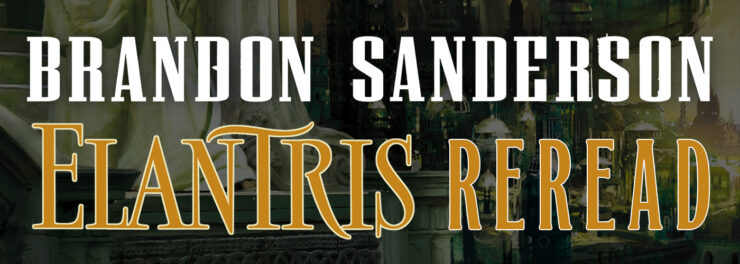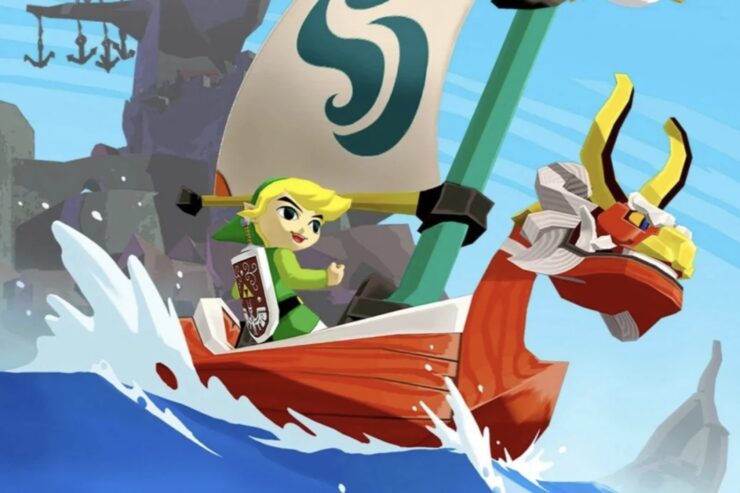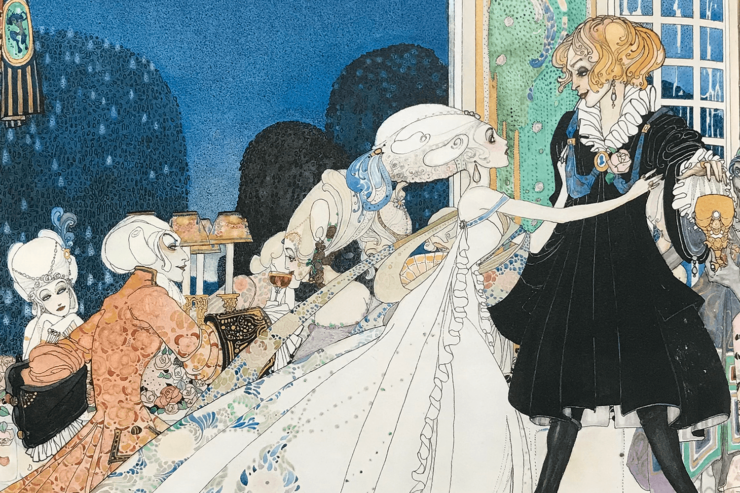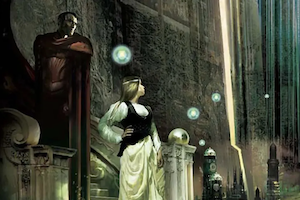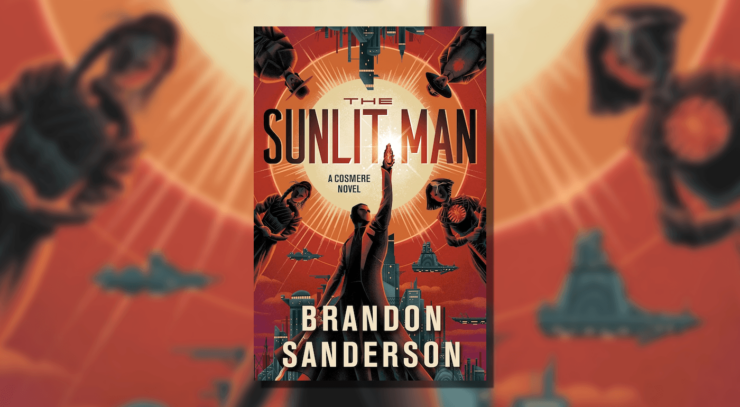Paige: Happy Thursday, Cosmere Chickens! Hope you’re ready for some pulpit pounding and then a silent incursion into Iadon’s palace. Today we not only see Hrathen envying Dilaf’s passion, but we see Raoden make a powerful ally in Elantris as well as tweak the noses of some guards. Figuratively, of course.
So let’s get to it!
(Non-)Spoiler warning: This week’s article has no spoilers from other Cosmere works. Read on fearlessly, chickens!
Trigger warnings: Child abandonment, chronic pain.
Last time on Elantris: Food and Fellowship…
Sarene comes up with a fantastic plan to overturn the corrupt government, and manages to win over the nobles to her side. That plan? To free the slaves and actually pay them for their work, thereby increasing productivity and flipping the entire economy in a new direction.
Chapter Essentials
POV Character(s): Hrathen, Raoden
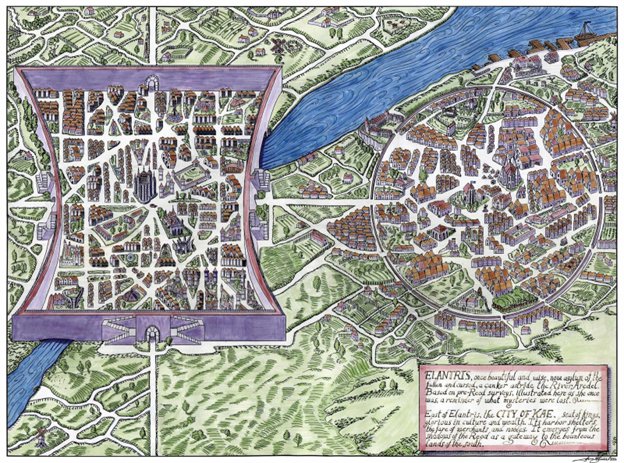
Discussion
Chapter 12
It seemed foolish to require an entire nation to learn a new language before allowing them to hear of Jaddeth’s empire. So, when forced to make the decision between profanity and infinite delay, Hrathen chose profanity. He had learned to speak Aonic and Duladen, and had even picked up a little JinDo. When he taught, he taught the people in their own tongue—though admittedly, it still bothered him to do so.
P: So Fjordell is a holy language and speaking Aonic or Duladen is profane. These people are so arrogant, it boggles my mind. Hrathen is afraid that speaking to the people in their own tongue will make them think they won’t have to learn Fjordell after they convert. Though I highly doubt all of the people watching the sermon will want to convert. They’re likely seeing the whole matter as a passing fancy and their attention will wander eventually.
It wasn’t that he lacked focus or dedication; he had simply given the same speeches so many times that they had become rote. He spoke almost unconsciously, raising and lowering his voice to the rhythm of the sermon, performing the ancient art that was a hybrid offspring of prayer and theater.
P: One could almost say that “rote” equals “dull and boring,” but the people listening seem to respond enthusiastically in all the right places.
Buy the Book


The Water Outlaws
L: Well, rote and routine to him, but certainly not to the people who haven’t heard it all before. Give them a couple weeks and they’d likely stray… unless someone else should happen to take the pulpit and capture their attention!
He finished with a stunning admonition to serve in Jaddeth’s kingdom, to swear themselves as odiv or krondet to one of the priests in Kae, thereby becoming part of the chain that linked them directly to Lord Jaddeth.
P: It seems such a demanding religion, with followers needing to swear themselves to a priest. It feel so subservient, but I guess that’s what this religion is all about—only those closest to Jaddeth are respected.
However, a sudden sound stopped them. Hrathen looked up at the podium with surprise. The meeting was to have ended after his sermon, but someone thought differently. Dilaf had decided to speak.
L: Oh great.
P: I truly expected the crowd to continue leaving once Dilaf began to rant, but he held their attention, amazingly enough. Was that because he was that engaging or was it because he was just more interesting than Kae priests?
L: Well, passion is captivating.
Hrathen had no hatreds so severe that he wept, no loves so profound that he would risk everything in their name.
L: Part of me wonders if Brandon’s channeling a bit of himself into Hrathen here. He’s a remarkably level-headed person, and as any writer knows, there are parts of you that creep into your characters both intentionally and not.
P: Parts of you do creep into your characters, no matter how much you may try to avoid that. They’re all a part of the writer, though.
“However, you must remember your place, Arteth. You are my odiv; you do not act unless I specifically tell you. Is that understood?”
“Perfectly, my lord Hrathen.”
L: Uh huh. Sure. I’ll believe that when I see it.
P: Right? I think Dilaf got a little taste of power during his impromptu sermon, and no doubt he’ll preach again.
The lock clicked, and Hrathen pulled the top open with a firm hand. A small glowing ball sat patiently inside.
“You need me, my lord?” the seon asked in a soft, feminine voice.
“Be quiet!” Hrathen ordered. “You know you are not to speak.”
L: Ugh. How awful. Keeping the poor seon locked into a box, not treating it like the sapient being it is… Hrathen is such a fascinating character. One moment I respect him for his attempts to save people, and then the next he loses me again and makes me despise him.
P: Hrathen is such a well-written character that we can change the way we feel about him from one line to the next. With most characters I loathe, I loathe them no matter what they do. Hrathen does have some good moments, though. He just sees most everyone and everything as being beneath him.
Chapter 13
“Sule, I can’t read that,” Galladon protested, looking down at the book. “It’s written completely in Aons.”
“That’s what made me suspicious,” Raoden said.
“Can you read it?” Galladon asked.
“No,” Raoden said with a smile. “But I do have this.” He reached down and pulled out a similar coverless volume, its cover pages stained with Elantris grime. “A dictionary of the Aons.”
P: Raoden has found a book that can translate Aons and is going to try to translate a text written exclusively in Aons. To what end? To learn what happened to Elantris? The answer won’t lie there, Prince. Unless the book explains the first Aon to draw and why? I don’t rightly recall if that’s how Raoden solves their problem. Anyone?
L: It’s as good a place to start as any…
“All right, sule. I don’t envy you the task, however. Life would be much simpler if it hadn’t taken your people so long to invent an alphabet. Kolo?”
“The Aons were an alphabet,” Raoden said. “Just an incredibly complex one.”
L: Sounds similar to Chinese. I studied both Chinese and Japanese in college, and the written languages are beautiful and—just as Raoden says here—complex ones.
P: Incredibly complex. Is there art anywhere of a complete alphabet of Aons, I wonder? I feel like I should know whether or not there is but it’s escaping me at the moment.
L: There are quite a few of them on the Coppermind wiki!
According to Raoden’s orders, and equipped with a newly fashioned pair of leather gloves, Loren moved rocks and cleared away refuse, revealing the soft dirt underneath.
“What good is that going to do?” Galladon asked, following Raoden’s gaze out the window.
“You’ll see,” Raoden said with a secretive smile.
L: Still here dropping the hints. Raoden’s grand plan to feed everyone is slowly, slowly coming to fruition.
P: Oh, so slowly. I can’t imagine how long it will take to actually grow the corn and if he really could feed all of Elantris with it, but it’s a noble undertaking.
“Lord Spirit?” a hesitant voice asked.
…
“My lord…” the man began.
“Go on,” Raoden prodded.
“Well, Your Lordship, I’ve just heard some things, and I was wondering if I could join with you.”
Raoden smiled, rising and walking over to the man. “Certainly you may join us.”
P: And so Raoden’s collection of Elantrians grows. Kahar, as this man is called, was a cleaner, and at last Raoden has someone to set to cleaning the walls of the church he’s made his base of operations. Kahar has heard that Raoden can solve the problem of their constant hunger. Time will tell if Raoden’s plan of distraction and confidence can defeat that particular demon.
“What is it, Saolin?” Raoden asked, alarmed. The man was an experienced warrior, and was not easily unsettled.
“A group of armed men coming this way, my lord. I counted twelve of them, and they are carrying steel weapons.”
P: I mean, we knew it was bound to happen eventually. None of the warlords were going to suffer an upstart for long. We’ll soon find out why this one does.
L: I can’t even begin to imagine how terrifying weapons are in a society where you can’t heal from even the most minor of wounds.
“Karata,” Raoden said. Loren should have been hers the other day, but Raoden had stolen him. Apparently she had come to make a complaint. It had only been a matter of time.
P: Of the three other leaders in Elantris, Karata seems the least extreme or unhinged.
L: Especially once we learn what she’s really like.
There was a tense pause. Eventually Karata turned to one of her men.
“Destroy the building, chase them out, and break some bones.” She turned to leave.
“I can get you into Iadon’s palace,” Raoden said quietly.
Karata froze.
P: Looks like I spoke too soon. She’s certainly brutal. But it sounds as if Raoden knows how to get to her. Get her into the palace? To what purpose?
Galladon looked pained. “Sule, do we have to grow? Do you have to start another gang? Aren’t three warlords enough?”
Raoden stopped, looking up at the large Dula with concern. “Galladon, is that really what you think I am doing?”
“I don’t know, sule.”
“I have no wish for power, Galladon,” Raoden said flatly.
P: It’s kind of disappointing that Galladon jumps to this conclusion. What he’s learned of Raoden thus far should have shown him that his friend didn’t want to lord over Elantris. Though, to be fair, Raoden could be a little more forthcoming with his plans.
“What is this?” Karata asked suspiciously.
“Our exit,” Raoden said, peering over the low stone wall of Elantris’s only well. It was deep, but he could hear water moving in the darkness below.
“You expect us to swim out?”
“No,” Raoden said, tying Mareshe’s rope to a rusted iron rod jutting from the well’s side. “We’ll just let the current take us along. More like floating than swimming.”
P: Turns out it wasn’t quite like floating; Raoden had to maneuver himself through the tunnel to keep from bouncing along with the current. Crashing into walls, no matter how smooth they were, wouldn’t help minimize aches and pains.
L: Yeah, definitely not envying him all those bruises for the rest of eternity.
In one thing only was Iadon paranoid: sleeping. The king was terrified that assassins would somehow sneak in and murder him as he slumbered.
L: That seems prescient. I honestly don’t remember if this winds up happening or not…
P: Not exactly… but I’ll discuss it once we get there.
I won’t let her kill my father, he decided. No matter how poor a king he is, I won’t let her do that. “You have to answer something for me first.”
P: I’m not sure what he would have done had she tried to kill Iadon, but turns out she had zero interest in him and was after something much more important.
Karata stooped beside something that Raoden hadn’t noticed at first: a mattress on the floor, occupied by a small lump that could only have been a sleeping child, its features and gender hidden to Raoden in the darkness. Karata knelt beside the child for a quiet moment.
L: Oh… oh, man. This is just heartbreaking. To be separated from your own child this way… still alive, but thought dead, and unable to see them…
P: This stabs me right in my feels. To know that she just wanted to see her child. I have a new respect for Karata.
“That was my daughter,” Karata said. “I doubt anyone ever told her what happened to me. I just… wanted her to know.”
“You left her a note?”
“A note and a keepsake.” Karata’s voice was sad, though no tears could fall from her Elantrian eyes. “My necklace. I managed to sneak it past the priests a year ago. I wanted her to have it—I always intended to give it to her. They took me so quickly… I never said goodbye.”
L: This whole situation just gets worse and worse the more we learn about those who are affected by it.
P: Never getting to say goodbye, never getting any closure, knowing that your family either despises what you’ve become or thinks you dead… what a horrible weight to add to an already horrible existence.
“Yes,” Karata said. “Thank you. You have done me a great service this night, my prince.”
Raoden froze.
“Yes, I know you. I lived in the palace for years, with my husband, protecting your father and your family. I watched you from your childhood, Prince Raoden.”
L: Oops, haha. Well, the gig’s up now, Raoden.
P: Let’s just see if she’ll keep his secret, as he asks her to do!
“Seed corn?” Karata whispered.
“I’ve been collecting it from the newcomers,” Raoden said. “The rest of the offerings don’t interest me—only the corn. We can plant it, Karata. There aren’t that many people in Elantris; it wouldn’t be hard to feed them all. Goodness knows we have enough free time to work a garden or two.”
Karata’s eyes were wide. “No one’s ever tried that before,” she said, dumbfounded.
L: This is explained away in the next sentence, but I still find it incredibly hard to believe that no one has thought to try this, with how desperate they are.
P: I’ve often wondered this, but I suppose it comes down to being so downtrodden and hopeless. You have to have foresight to grow crops. And defeated people have little foresight.
They turned a corner and approached the broad gate to Elantris. A squat building sat beside it, light pouring from the windows. Several guards lounged inside, their brown-and-yellow Elantris City Guard uniforms bright in the lamplight. Raoden approached the building and tapped on a window with the back of his fist.
“Excuse me,” he said politely, “but would you mind opening the gates please?”
The guards, who had been playing a game of cards, threw back their chairs in alarm, shouting and cursing as they recognized his Elantrian features.
“Be quick about it,” Raoden said airily. “I’m getting tired.”
P: And so Raoden tweaks the noses of the guards by demanding to be let back into Elantris. He even quips that he’ll see about getting them a raise. I found this scene to be quite funny!
The children were happy. Though most slept, a few were awake, and they giggled and played with one another. They were all bald, of course, and they bore the marks of the Shaod. They didn’t seem to mind.
“So this is where they all go,” Raoden said, interested.
L: I’m relieved that they’re not just left to their own devices and torments.
P: So Karata is the gatherer and protector of Elantris’s children. She just gained in my esteem by leaps and bounds.
“The children unite us, keep us from giving in to the pain. The food we gather is for them. Somehow, we can endure the hunger a little better if we know it has come, in part, because we gave what we had to the children.”
L: Well, I just absolutely adore her now.
P: Right? Great character, Brandon!
Raoden nodded. Then after a moment he asked, “Why are you showing me this?”
Karata hesitated. “Because I want to join with you. I once served your father, despite what I thought of him. Now I will serve his son because of what I think of him. Will you accept my loyalty?”
“It would be an honor, Karata.”
P: And so Raoden collects an entire gang of Elantrians, and takes responsibility for its children. That’s a lot to take on, but if anyone is up for it, it’s our Raoden.
We’ll be leaving further speculation and discussion to you in the comments, and hope to join you there! Next week, we’ll be back with chapter 14.
Paige resides in New Mexico, of course. Between work and school and the SA5 beta read, she’s trying to work on book 3 of a YA/Crossover trilogy with just a hint of the supernatural. Read book 1 on her Patreon. Links to that and to her other writing are available in her profile.
Lyndsey is absolutely wiped out this week after a long weekend running a stage combat act at the Maine Renaissance Faire. If you enjoy queer protagonists, snarky humor, and don’t mind some salty language, check out book 1 of her fantasy series. Follow her on Facebook or TikTok!










